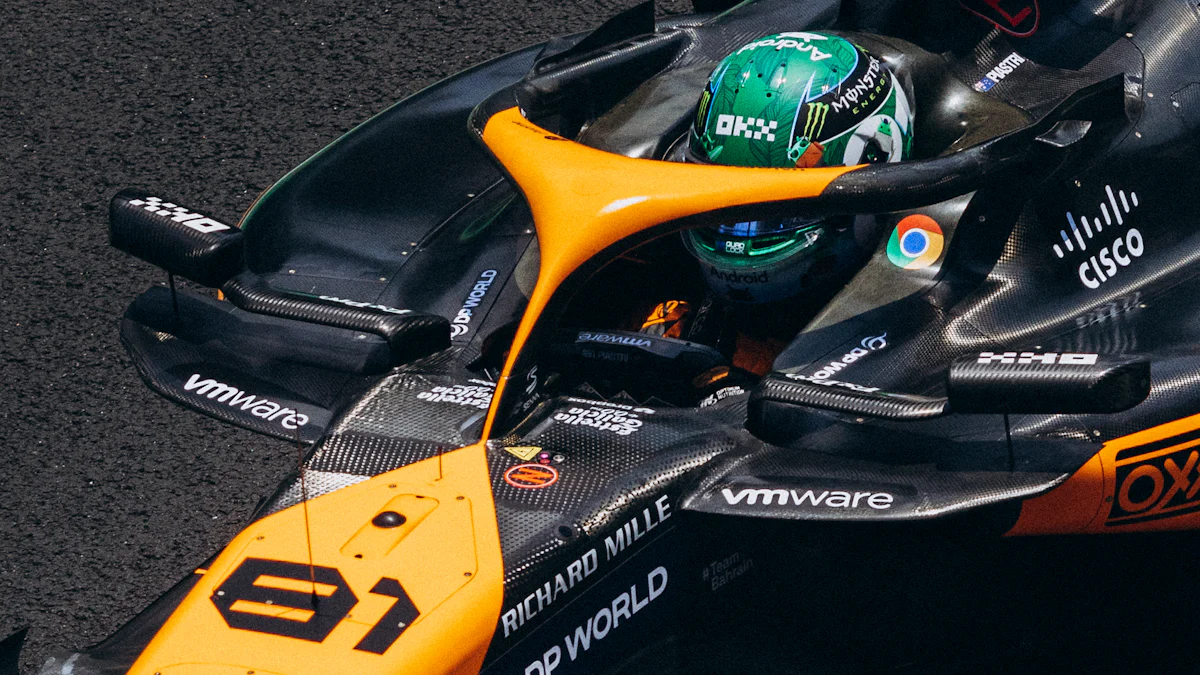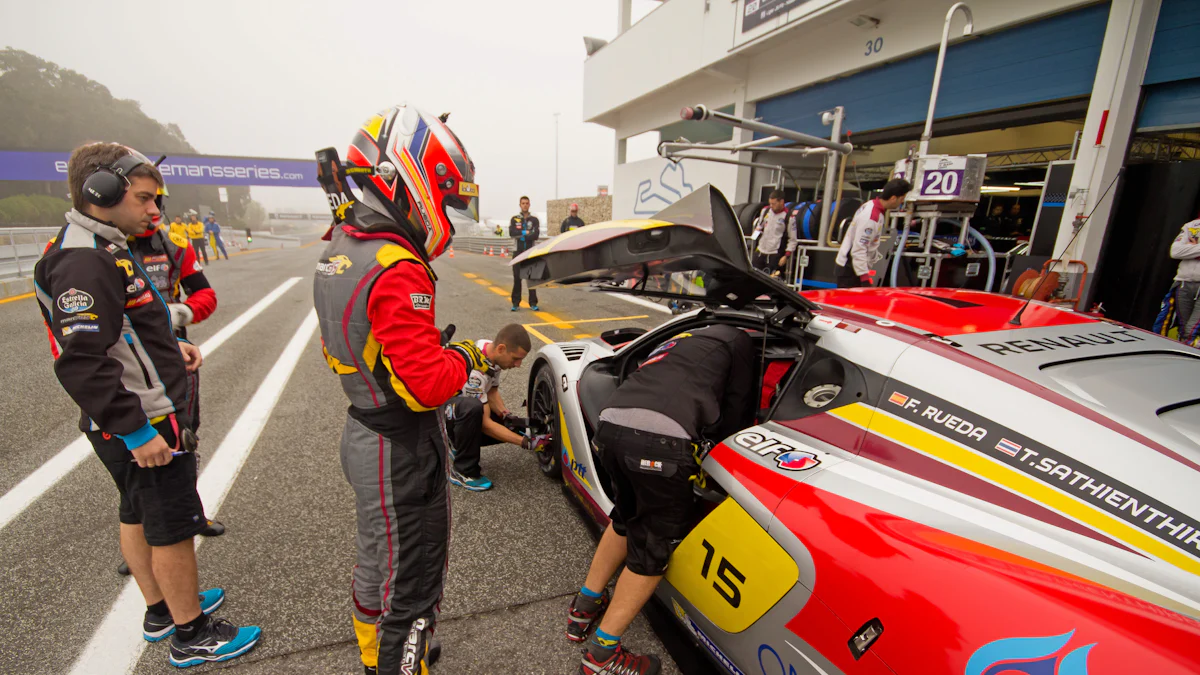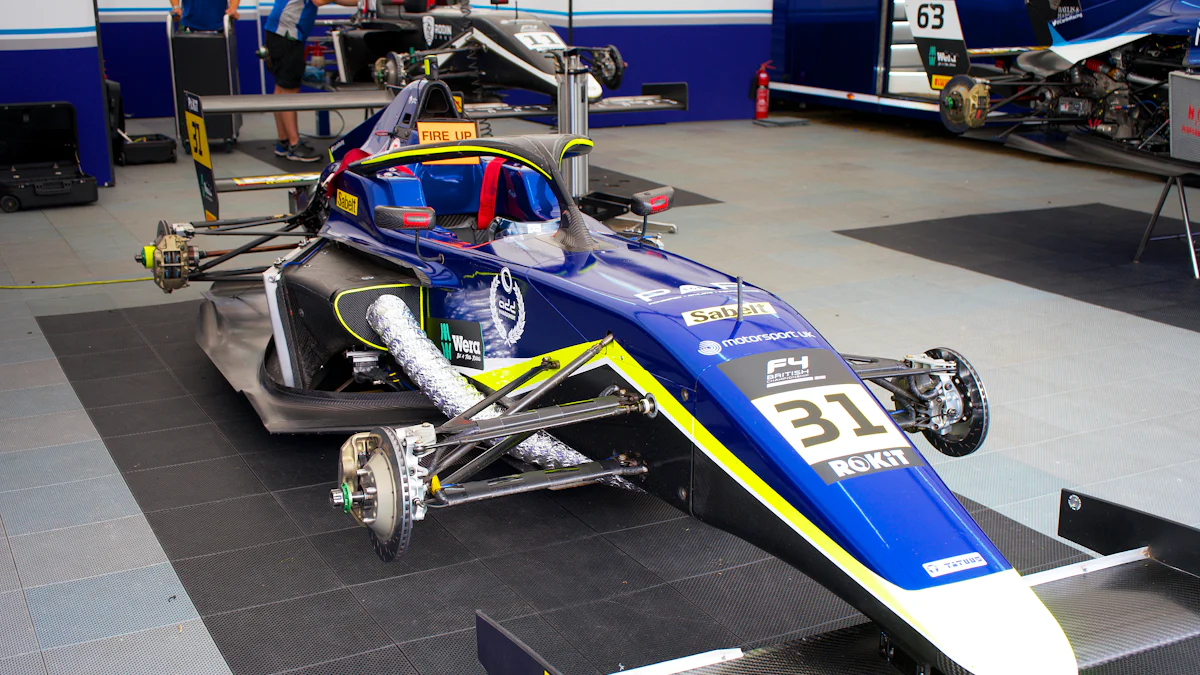How to Start Your Career in Formula 1 Research
Try Aihirely for
Smarter Interview Prep
Experience real-time AI support tailored to your Resume.
Boost your confidence and ace every question with
AI Mock Interview.

Image Source: pexels
Formula 1 research is the intersection of science and speed. It’s more than just fast cars—it’s about advancing technology and driving innovation to new heights. If you’re passionate about motorsport and enjoy tackling complex challenges, this could be the perfect career path for you. However, entering this field can be tough. You’ll need strong technical skills, practical experience, and a well-thought-out plan. Whether you’re beginning your journey or considering a career change, these apply for Formula 1 research jobstips can guide you in taking the first step toward achieving your goals.
Key Takeaways
-
To work in Formula 1 research, you need a degree in engineering, physics, or computer science. Focusing on aerodynamics or materials science can help you stand out.
-
Get real-world experience by doing internships with Formula 1 teams or joining university motorsport programs. These experiences teach useful skills and help you meet important people.
-
Making connections is very important in motorsports. Go to events, use LinkedIn, and talk to professionals to find job chances.
-
Learn technical skills like CAD, simulation tools, and programming. These skills are needed to study data and improve car performance.
-
Show your love for motorsports in your resume and cover letter. Include projects and experiences that prove your dedication to the field.
Understanding Formula 1 Research

Image Source: pexels
What is Formula 1 Research?
Formula 1 research is all about pushing the boundaries of technology to make race cars faster, safer, and more efficient. It involves studying every detail of a car’s design, from its aerodynamics to its materials, to gain even the smallest advantage on the track. You’ll find researchers working on cutting-edge simulations, testing new components, and analyzing data to improve performance. This field combines science, engineering, and creativity to solve problems and innovate in ways that impact not just motorsport but also industries like aerospace and automotive.
Key Roles in Formula 1 Research
Aerodynamics and CFD
Aerodynamics is one of the most critical areas in Formula 1 research. It focuses on how air flows around the car to maximize speed and stability. Researchers use Computational Fluid Dynamics (CFD) to simulate airflow and test designs without needing a physical wind tunnel.
-
Aerodynamics research improves downforce, giving cars better traction and stability.
-
Reducing drag helps cars maintain higher speeds during races.
-
Features like low ground clearance and sleek shapes enhance aerodynamic efficiency.
Data Analysis and Simulation
Data is king in Formula 1. Teams collect massive amounts of information from sensors on the car during races and simulations. As a researcher, you’ll analyze this data to identify patterns and make decisions that improve performance. Simulation tools also allow you to test strategies and setups before race day, saving time and resources.
Materials Science and Engineering
The materials used in Formula 1 cars must be lightweight yet incredibly strong. Researchers in this area develop advanced composites and metals that can withstand extreme conditions. You’ll explore how to make cars faster without compromising safety or durability.
Performance Engineering and Strategy
This role focuses on optimizing the car’s performance during races. You’ll work closely with drivers and engineers to fine-tune setups, plan pit stops, and develop strategies that give your team a competitive edge.
Why Formula 1 Research Matters
Formula 1 research isn’t just about winning races—it has a broader impact. It drives innovation in technology and benefits the economy.
| Economic Benefit | Description |
|---|---|
| Community Engagement | Initiatives like the Las Vegas Grand Prix Foundation support local charities. |
| Job Creation | Formula 1 events create thousands of jobs, boosting local economies. |
| Increased Tourism | Races attract visitors, helping businesses and tourism recover post-pandemic. |
Beyond economics, Formula 1 inspires future engineers and scientists. Educational programs tied to its technology encourage students to explore STEM fields. Community outreach also connects motorsport with local cultures, making it more than just a sport—it’s a platform for progress.
Educational Qualifications and Skills
Academic Background
Degrees in Engineering, Physics, or Computer Science
To break into Formula 1 research, you’ll need a strong academic foundation. Most roles require a degree in fields like engineering, physics, or computer science. These disciplines teach you the principles of mechanics, thermodynamics, and data analysis—skills that are essential for solving real-world problems in motorsport. If you’re still deciding on a major, think about what excites you most. Do you enjoy designing systems? Engineering might be your path. Love crunching numbers? Physics or computer science could be a better fit.
Importance of Specializations
Specializing can set you apart from the competition. For example, focusing on aerodynamics, materials science, or vehicle dynamics can make you a valuable asset to a Formula 1 team. Many universities offer programs tailored to motorsport engineering, which can give you a head start. If your school doesn’t, consider taking elective courses or pursuing certifications in areas like computational fluid dynamics (CFD) or advanced materials.
Tip: Look for opportunities to work on motorsport-related projects during your studies. These experiences can help you stand out when applying for jobs.
Technical Skills
CAD and Simulation Software
Proficiency in computer-aided design (CAD) and simulation software is a must. Tools like SolidWorks, CATIA, and ANSYS are widely used in Formula 1 research. They help you design and test components virtually, saving time and resources. Simulation software is especially important for studying aerodynamics and vehicle dynamics.
-
CAD software like SolidWorks and CATIA for designing car components.
-
Simulation tools for aerodynamics (e.g., CFD) and vehicle dynamics.
-
Knowledge of thermodynamics and fluid mechanics for performance optimization.
Programming and Data Analysis
Programming and data analysis are game-changers in Formula 1. Teams rely on data to optimize performance and make decisions. Knowing how to use tools like MATLAB and Python can give you an edge.
-
Analyze data to monitor aspects like tire pressure and aerodynamics.
-
Predict race dynamics, such as fuel consumption and tire degradation.
-
Use real-time data during races to adjust strategies and make critical decisions.
Motorsport Regulations and Dynamics
Understanding the rules of the game is just as important as technical skills. Familiarize yourself with motorsport regulations and vehicle dynamics. This knowledge ensures your designs comply with the rules and perform well on the track.
Soft Skills
Problem-Solving and Creativity
Formula 1 research is all about solving complex problems. You’ll need to think creatively to find innovative solutions. Whether it’s improving aerodynamics or developing new materials, your ability to approach challenges from different angles will set you apart.
Teamwork and Communication
Teamwork is the backbone of Formula 1 success. You’ll collaborate with engineers, drivers, and strategists to achieve common goals. Clear communication is critical, especially during high-pressure situations like races. Miscommunication can lead to costly mistakes, as seen in past Grand Prix events. Developing a common language and using clear phrases can help your team stay on the same page.
Note: Strong teamwork and communication skills aren’t just nice to have—they’re essential for avoiding penalties and ensuring smooth operations during races.
Gaining Relevant Experience
Internships and Placements
Applying to Formula 1 Teams and Suppliers
Internships with Formula 1 teams or their suppliers are a fantastic way to get your foot in the door. These opportunities give you hands-on experience in a fast-paced, high-pressure environment. You’ll learn how to solve problems quickly and work effectively with a team. Plus, you’ll connect with industry professionals who can open doors for your future.
-
Gain practical skills while working on real-world projects.
-
Build a network of contacts in the motorsport industry.
-
Add a prestigious internship to your resume, showing your dedication and ambition.
-
Develop specialized skills in areas like aerodynamics or data analysis.
-
Grow personally by learning to adapt and thrive under pressure.
Tip: Keep an eye on the careers pages of Formula 1 teams and their suppliers. Many post internship opportunities regularly.
Leveraging University Motorsport Programs
If you’re in college, your university’s motorsport programs can be a goldmine for experience. Competitions like Formula Student let you design, build, and race a single-seater car. This gives you practical experience in a regulated environment, much like Formula 1.
-
Work on personal projects like designing components or building cars.
-
Learn industry-standard tools like CAD and CFD software.
-
Gain teamwork experience by collaborating with peers on complex projects.
Note: Even if your school doesn’t have a motorsport program, you can still create your own projects to showcase your skills.
Personal Projects and Research
Building a Portfolio
Your portfolio is your chance to shine. Include projects that demonstrate your technical skills and creativity. For example, you could design a car component using CAD software or analyze race data to optimize performance. A strong portfolio shows employers what you’re capable of and sets you apart from other candidates.
Publishing Research or Case Studies
Publishing your work can boost your credibility. Write case studies or research papers on topics like aerodynamics or materials science. Share them on platforms like LinkedIn or in academic journals. This not only highlights your expertise but also shows your passion for Formula 1 research.
Tip: Don’t underestimate the power of a well-documented project. It can make a big impression during job interviews.
Entry-Level Roles
Starting with Smaller Racing Teams
You don’t have to start with a Formula 1 team. Smaller racing teams often have entry-level roles that can help you gain valuable experience. These roles let you work on various aspects of car performance and strategy, giving you a well-rounded skill set.
Transitioning from Related Fields
If you’re already working in a related field like aerospace or automotive engineering, you’re in luck. Many of the skills you’ve developed—like working with advanced materials or analyzing data—are directly transferable to Formula 1 research. Use this to your advantage when applying for roles.
Note: Every bit of experience counts. Whether it’s with a smaller team or in a related industry, it all adds up to make you a stronger candidate.
Networking in the Motorsport Industry

Image Source: pexels
Building a career in Formula 1 research isn’t just about technical skills. Who you know can be just as important as what you know. Networking helps you connect with professionals, learn from their experiences, and open doors to opportunities. Let’s explore how you can build meaningful connections in the motorsport industry.
Building Connections
Attending Motorsport Events
Motorsport events are goldmines for networking. Whether it’s a Formula 1 race, a career fair, or a trade show, these gatherings bring together professionals from across the industry. You can meet engineers, team managers, and even recruiters. Start conversations, ask questions, and show genuine interest in their work.
-
Events like the SEMA show in Las Vegas or the PRI show in Indianapolis are perfect for meeting industry insiders.
-
Stay at the track during events instead of heading back to your hotel. You’ll maximize your chances of connecting with others.
-
Don’t overlook informal settings like paddock parties. These relaxed environments often lead to valuable insights and connections.
Tip: Be curious! Asking thoughtful questions not only helps you learn but also leaves a positive impression.
Engaging on LinkedIn
LinkedIn is a powerful tool for networking in motorsport. Create a professional profile that highlights your skills and passion for Formula 1 research. Follow teams, suppliers, and key figures in the industry. Engage with their posts by commenting or sharing your thoughts. This keeps you on their radar and shows your enthusiasm.
Pro Tip: Send personalized connection requests. Mention why you admire their work or how you’d like to learn from them.
Leveraging University and Alumni Networks
Your university’s alumni network can be a hidden gem for networking. Many graduates work in motorsport or related fields. Reach out to them for advice or mentorship. They’ve been in your shoes and can guide you on your journey.
If your school has a motorsport program, use it to your advantage. Professors and program directors often have connections with industry professionals. Don’t hesitate to ask for introductions or recommendations.
Note: Alumni are usually happy to help. A simple message like, “I’m interested in Formula 1 research and would love to hear about your experience,” can go a long way.
Joining Motorsport Communities
Motorsport communities, both online and offline, are fantastic for networking. They provide a sense of camaraderie and a platform to share knowledge. You’ll meet enthusiasts, professionals, and even recruiters who share your passion.
-
Join forums, social media groups, or local clubs dedicated to motorsport.
-
Participate in organized events or rides to meet people face-to-face.
-
Share your projects or insights with the community. This showcases your skills and builds your reputation.
Tip: Being active in these communities not only helps you learn but also keeps you updated on industry trends and opportunities.
Networking might feel intimidating at first, but it’s all about building genuine relationships. Take small steps, stay consistent, and watch your connections grow. Who knows? Your next conversation could lead to your dream job in Formula 1 research.
Tips to Apply for Formula 1 Research Jobs
Crafting a Standout Resume and Cover Letter
Highlighting Relevant Skills
Your resume should focus on the skills that make you a strong candidate for Formula 1 research. Highlight technical abilities like CAD, simulation software, or programming. Include any experience with motorsport projects, internships, or competitions like Formula Student. Use bullet points to make your achievements easy to read. For example, instead of saying, “Worked on a car design,” write, “Designed and tested aerodynamic components using CFD software, improving efficiency by 15%.”
Demonstrating Passion for Motorsport
Employers want to see your genuine enthusiasm for motorsport. Show this by mentioning activities that reflect your commitment.
-
Volunteer at motorsport events or join racing clubs.
-
Participate in university motorsport programs or personal projects.
-
Build connections in the motorsport community through events or LinkedIn.
Your cover letter is the perfect place to explain why you love Formula 1. Share a specific story or moment that inspired you to pursue this career. Passion can set you apart from other applicants.
Preparing for Interviews
Researching the Team and Role
Before your interview, learn everything you can about the team and the position. Visit their website, read recent news, and study their performance in recent seasons. Understand their values and goals. This shows you’re serious about the role and helps you tailor your answers.
Practicing Technical and Behavioral Questions
Interviews often include technical and behavioral questions. Be ready for both.
-
Technical questions: Expect to solve problems related to your role, like analyzing data or explaining engineering principles.
-
Behavioral questions: Prepare to discuss teamwork, problem-solving, and handling pressure. For example, you might be asked, “How did you resolve a conflict with a teammate?” or “Why do you want to work in Formula 1?”
Practice answering these questions out loud. This builds confidence and helps you organize your thoughts.
Following Up After Applications
After you apply, don’t just wait. Follow up with a polite email to show your interest. Mention the position and thank them for considering your application. If you had an interview, reference something specific you discussed. This keeps you on their radar and shows you’re proactive.
Breaking into Formula 1 research takes effort, but these apply for formula 1 research jobs tips can help you stand out. Focus on showcasing your skills, passion, and preparation to make a lasting impression.
Breaking into Formula 1 research isn’t easy, but it’s absolutely worth it if you’re passionate about motorsport. You’ll need persistence and a clear plan to succeed. Focus on building a strong foundation with the right education and hands-on experience. Networking is just as important—connect with professionals and stay active in motorsport communities.
Keep learning and improving your skills. Every step you take brings you closer to your dream. Use these apply for formula 1 research jobs tips to stand out and make your mark in this exciting field. You’ve got this! 🚀
FAQ
What degree should I pursue for a career in Formula 1 research?
You’ll need a degree in engineering, physics, or computer science. Specializing in areas like aerodynamics, materials science, or vehicle dynamics can give you an edge. Look for programs with motorsport-related courses or opportunities to work on racing projects.
Tip: Universities offering motorsport engineering programs can provide a head start.
How can I gain experience if I’m still in school?
Join motorsport programs like Formula Student or work on personal projects. Internships with racing teams or suppliers are also great options. These experiences help you build practical skills and a strong portfolio.
Note: Even small projects, like designing components in CAD, can make a big impression.
Do I need to know programming for Formula 1 research?
Yes! Programming is essential for data analysis and simulations. Learn languages like Python or MATLAB. These skills help you analyze race data, predict performance, and optimize strategies.
Pro Tip: Start with online tutorials or courses to build your programming foundation.
Is networking really that important in motorsport?
Absolutely! Networking connects you with industry professionals and opens doors to opportunities. Attend motorsport events, engage on LinkedIn, and join online communities. Building relationships can lead to internships, mentorships, or even job offers.
Tip: A simple, genuine conversation can make a lasting impression.
Can I transition to Formula 1 research from another industry?
Yes, many skills from fields like aerospace or automotive engineering transfer well. Highlight your expertise in areas like materials science, aerodynamics, or data analysis when applying. Use your experience to show how you can contribute to a Formula 1 team.
Note: Every bit of relevant experience strengthens your application.
